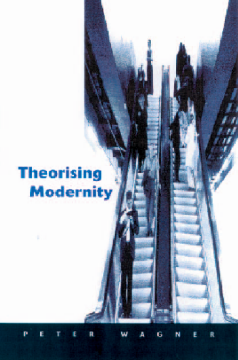
Additional Information
Book Details
Abstract
This book argues that sociology has lost its ability to provide critical diagnoses of the present human condition because sociology has stopped considering the philosophical requirements of social enquiry. The book attempts to restore that ability by retrieving some of the key questions that sociologists tend to gloss over: inescapability and attainability. It then demonstrates how these questions have been addressed in different forms and by different intellectual means during the past 200 years and shows how they persist today.
Table of Contents
| Section Title | Page | Action | Price |
|---|---|---|---|
| 1 Introduction: institutionalizing participatory approaches in Ethiopia’s agricultural research system | |||
| Kiyoshi Shiratori and Dawit Alemu | |||
| Part I The need for Farmer Research Groups in Ethiopia | |||
| 2 Overview of Farmer Research Group-based participatory research in Ethiopia | |||
| Dawit Alemu and Kiyoshi Shiratori | |||
| 3 FRG-based approach implementation processes: guidelines, training and research | |||
| Taku Seo | |||
| Part II Experiences of Farmer Research Groups | |||
| 4 Engaging farmers in technology evaluation and promotion: Farmer Research Groups on common beans in the Central Rift Valley, Ethiopia | |||
| Endeshaw Habte, Kidane Tumsa, Berhanu Amsalu Fenta, and Abiy Tilahun | |||
| 5 Lowering teff seeding rate using a seed spreader via the participatory approach in South Ethiopia | |||
| Fanuel Laekemariam, Gifole Gidago and Wondemeneh Taye | |||
| 6 Participatory evaluation of selected fish processing and preservation technologies: the case of Lake Tana, Ethiopia | |||
| Shewit Gebremedhin, Markos Budusa, Adamu Yimer, Minwyelet Mingist, Dereje Tewabe and Zurihun Nigussie | |||
| 7 Participatory evaluation of farmer-saved and purified seed for improved agronomic performance: wheat, South eastern Tigray | |||
| Alem G/tsadik, Kelali Haftu, Yoshiaki Nishikawa, Ibrahim Fitiwy and Taku Seo | |||
| 8 Improved dairy production and changing gender roles: experience of smallholder FRGs in Melkassa, Central Rift Valley | |||
| Bedru Beshir | |||
| 9 Farmers’ perceived benefits of FRG-based research: the case of selected FRG-based research activities | |||
| Shingo Takeda | |||
| Part III Institutionalizing Farmer Research Groups in Ethiopia | |||
| 10 The participatory approach and FRG: the institutionalization process within the Ethiopian agricultural research system | |||
| Dawit Alemu and Kiyoshi Shiratori | |||
| 11 The challenges of FRG-based research: attitudes, capacity and institutional arrangements | |||
| Dawit Alemu, Taku Seo, Terutaka Niide, Shingo Takeda, Kiyoshi Shiratori and Yoshiaki Nishikawa | |||
| 12 Applying the FRG approach in agricultural extension: lessons from the Farmers Research and Extension Group approach | |||
| Belay Kassa and Dawit Alemu | |||
| Part IV Conclusion | |||
| 13 Conclusion: Recommendations for strengthening the responsiveness of agricultural research systems | |||
| Dawit Alemu, Kiyoshi Shiratori, Taku Seo, and Yoshiaki Nishikawa | |||
| Index |
